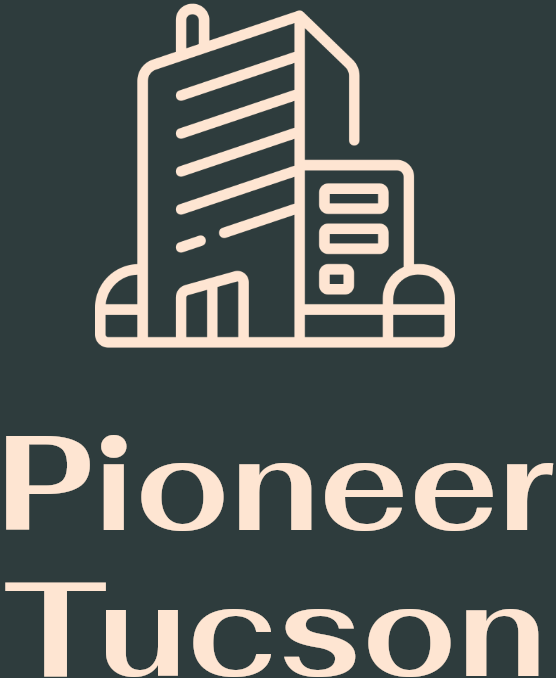Historic Significance and Modern Adaptation
Located at 100 N Stone Avenue in Tucson, Arizona, The Pioneer Tucson’s hotel/office is a historic landmark that embodies the city's rich history and architectural heritage. Originally constructed as a luxury hotel in the early 20th century, the building has been repurposed into modern retail spaces while preserving its historical significance. Uncover our history, architectural features, and their integral role in shaping Tucson's urban landscape today.

Origins and Evolution
Early 20th Century Beginnings
Built in 1929 by the renowned architectural firm Trost & Trost, The Pioneer Tucson hotel swiftly became an emblem of luxury and modernity in Tucson. It catered to affluent travelers and prominent local figures, establishing itself as a symbol of elegance in the city.
The Tragic Fire of 1970
On December 20, 1970, The Pioneer Tucson hotel experienced a tragic fire that killed 29 people, making it one of Arizona's deadliest fires. This event marked a significant turning point for the building. Despite the tragedy, the hotel remained operational for a few more years before ultimately closing its doors.
Transition to Office Space
Following the fire on December 20, 1970, the building underwent significant renovations and was repurposed as an office space for lease. Thereby allowing the historic structure to continue serving the community in a new and meaningful capacity. Today, it stands as a testament to resilience and adaptive reuse in Tucson's architectural landscape.
Design Elements
Art Deco Design
The Pioneer Tucson exemplifies Art Deco architecture with its striking geometric shapes, intricate ornamental details, and emphasis on vertical lines. The façade is adorned with elaborate decorative elements such as stylized floral patterns and chevron motifs, which are iconic of the Art Deco era.
Structural Layout
Originally planned as a 10-story hotel, the building featured luxurious guest rooms, a grand lobby, and amenities, including a ballroom and dining facilities. Upon conversion to office space, many of these original elements were preserved, with the interior redesigned to meet contemporary office requirements.
Historic Preservation
Efforts to maintain the building's historical integrity have focused on preserving key architectural elements, including the ornate exterior and the grand lobby. These meticulous preservation endeavors ensure that The Pioneer Tucson retains its status as a prominent landmark in the city of Tucson.
Impact on Tucson's Urban Environment
Economic Impact
The transformation of The Pioneer Tucson into office space has bolstered Downtown Tucson's economic vibrancy. Offering functional and appealing workspace solutions for businesses, the building serves as a pivotal component of the city's commercial landscape.
Cultural Legacy
As a cornerstone of Tucson's architectural heritage, The Pioneer Tucson occupies a significant role in the city's cultural narrative. Its storied history, marked by both tragedy and resilience, reflects Tucson's enduring spirit and ability to rejuvenate.
Community Engagement
Due to its central location, the building serves as a hub for community activities. It frequently hosts diverse events, ranging from art exhibitions to public forums, which cultivate a strong sense of community and engagement among Tucson's residents.
Current Utilization and Occupants
Modern Office Space
Today, The Pioneer Tucson accommodates a diverse array of businesses and organizations. Its prime downtown location and historic allure make it a sought-after choice for tenants seeking a prestigious address in Tucson's city center.
Key Tenants
The building hosts a range of prominent tenants, including law firms, financial institutions, creative agencies, and nonprofit organizations. This diversity underscores its versatility and broad appeal across various sectors.
Facility Offerings and Services
The office space boasts modern amenities such as high-speed internet, conference rooms, and convenient on-site parking, ensuring tenants have the resources for efficient operations.
Future Prospects and Developments
Ongoing Preservation Efforts
Preserving The Pioneer Tucson's historical integrity is an ongoing endeavor. Preservationists and building management collaborate closely to uphold the building's status as a cornerstone of Tucson's architectural heritage.
Upcoming Advancements
Future plans include potential expansions and additional modernization of interior spaces, which aim to improve the building's functionality while preserving its historical significance.
Community Outreach and Cultural Programs
The Pioneer Tucson at 100 N Stone Avenue stands as a cornerstone of Tucson's history, symbolizing the city's enduring spirit. From its origins as a luxury hotel to its current role as a modern office space, the building has adapted and evolved while retaining its historical charm. As Tucson continues to grow and develop, we will remain a vital part of the city's urban landscape, honoring its heritage while embracing future opportunities.
Strengthening Bonds
There is an increasing interest in utilizing the building's historical and cultural significance through expanded community-oriented events. These efforts aim to deepen the bond between The Pioneer Tucson and Tucson's community, honoring its storied past while nurturing a dynamic future. Contact us today to learn more about how you can participate in our community events and initiatives.
